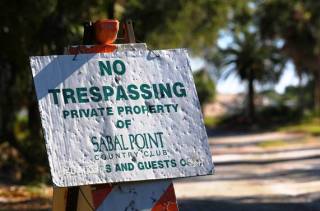Article
Courtesy of The Orlando Sentinel
By Martin E. Comas
Published October
31, 2013
When Bob Bruno bought his house in the Sabal Point
neighborhood more than two decades ago, he felt he'd found the perfect home.
Bruno loved to play golf, and he had a great view of the ninth fairway from his backyard.
"I thought that, for the rest of my life, I would look outside and have a view of the golf
course," Bruno said. "We actually picked it out because we would have no other homes in our backyard, and I thought it was going to be like that forever."
Bruno loved to play golf, and he had a great view of the ninth fairway from his backyard.
"I thought that, for the rest of my life, I would look outside and have a view of the golf
course," Bruno said. "We actually picked it out because we would have no other homes in our backyard, and I thought it was going to be like that forever."
|
A no trespassing sign marks what used to be
the entrance at the former Sabal Palm Country Club clubhouse, in Longwood, Friday, October 25, 2013. The course closed in 2006 and is now under consideration for new development. |
Hunicke and his neighbors likely won't be the last to lose
their fairway views to development. In the past decade, fewer players and a glut
of courses have made it harder to turn a profit. Owners have turned to closing
courses and building homes, disappointing current residents who moved into
golf-course communities for the fairway views.
"Unfortunately, we don't have anything that says that if people bought into a community, that they will always have that open space," said Nicole Guillet, deputy county manager in Seminole County.
In Volusia County, a developer recently submitted plans to build homes at what was DeLand Country Club, which closed last year. The owners of the Casselberry Golf Club are considering selling their land to a developer. And the Winter Springs Golf Club closed in 2007.
But there are precautions that consumers can take before signing a contract on that new home — all of them falling under the "buyer beware" umbrella.
"Unfortunately, we don't have anything that says that if people bought into a community, that they will always have that open space," said Nicole Guillet, deputy county manager in Seminole County.
In Volusia County, a developer recently submitted plans to build homes at what was DeLand Country Club, which closed last year. The owners of the Casselberry Golf Club are considering selling their land to a developer. And the Winter Springs Golf Club closed in 2007.
But there are precautions that consumers can take before signing a contract on that new home — all of them falling under the "buyer beware" umbrella.
•Read all documents before signing a contract on a new house.
Or hire a real-estate lawyer to do so. A common assumption going into any
transaction, experts say, should be that nothing is permanent — whether it's a
golf course, a park or a vacant piece of land adjoining the home of your dreams.
If the house you're purchasing is in a community with a homeowners association, use its officers as a resource. They can tell you about any restrictions of development in open areas, said Guillet. Those restrictions might be a homeowner's strongest protections.
•Find out, through your county or city offices, what kind of development, if any, adjacent land is designated for. That information is public record. So request the documents to see what the land might become. Or call your city or county commissioner and ask them.
"A home is the biggest purchase you are going to make," said Duke Woodson, a land-use
attorney in Orlando. "And you're going to be presented with a pile of papers [before closing on the sale]. And in that pile of papers, it's going to specify any deed restrictions.
"Try to get a comfort level, so ou know what you will be protected against."
Even then, there are no guarantees.
Last year, for example, the owners of the Casselberry Golf Club told city officials that their business was no longer profitable and were considering selling it to a developer.
But a 1973 deed restriction on the property states that if the golf course ever becomes "economically unfeasible," then the owner "shall convey the property, free of charge" to Casselberry, and the city shall maintain it as a conservation area.
However, the owners of the Casselberry Golf Club have since filed a lawsuit against the city seeking to overturn that deed restriction.
In turn, Casselberry city commissioners this month agreed to look into purchasing the golf course property and turning it into a park with nature trails.
Joyce Potts, a longtime property appraiser and owner of Southern Appraisal Group, said it's hard to tell if home values in a golf course community will go up or down if new homes are built on the old fairways and greens. It might depend on whether the new homes are compatible with the existing ones.
Preliminary plans for the Sabal Point golf course do not show how many homes and town
houses will be built. Officials with the land-planning firm CPH, which is representing the property owner, Golf Brooke LLC, said it will likely be more than a year before new homes are approved.
Still, Hunicke said that most Sabal Point homeowners will accept some development, as long as it's compatible — including in size and price range — with the existing homes. And any new development should include plenty of open space.
"People moved to Sabal Point because of that open space that the golf course offered," Hunicke said. "But even people that don't live on the course are very concerned because of an increase in traffic and congestion and the loss of open space that new homes would bring."
